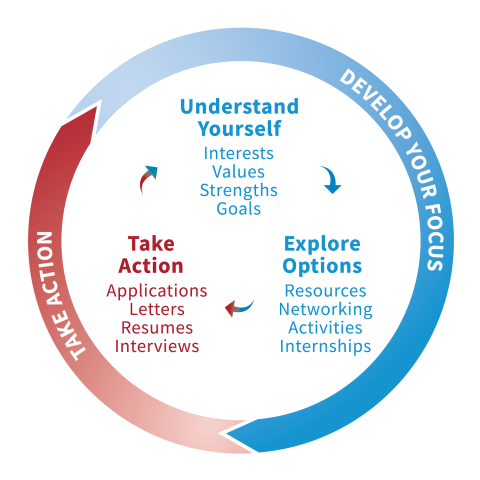Understand Yourself
Developing career goals requires two types of information: understanding yourself and exploring options that are compatible with your interests, values, and skills. It can be helpful to work with a career counselor, who may suggest that you use one of a variety of assessment tools to develop greater understanding.
Our Canvas Toolkit has very comprehensive resources with built in self-assessments and tools to help you reflect and take notes. The information below is a brief overview.
Think about what you enjoy doing, what is important to you, and what you do well. This can help you begin to create a picture of your ideal position, one that will bring you real job satisfaction.
Ask yourself questions such as:
-
What do I want to spend my days doing?
-
What do I like thinking, learning, and talking about?
-
Would I rather use my analytical skills or work with people?
-
What kind of work setting do I find most comfortable?
-
What kind of people do I want to work with, for, or around?
-
What kind of lifestyle would I like?
-
What salary do I need?
-
How much time do I want for myself, friends, family?
-
What type of employer would I like to work for?
-
Do I prefer to work independently, in a group, or with an individual?
-
What do I want to be doing in a year?
-
What motivates me to do my best?
For a list of career assessments to help with understanding your interests, values, and skills visit our Assessment Tools page.
Clarify Interests
Explore your work interests by reflecting on which courses and activities you've enjoyed and careers you've considered. Also consider hobbies, student organizations, volunteer activities, and other informal interests. Do you like working with people, data, things, or ideas, and how do you want to work with them?
-
People: Instructing, healing, entertaining, representing, etc.
- Data and Information: Compiling, classifying, computing, analyzing, etc.
- Things: Designing, manufacturing, arranging, coordinating, etc.
- Ideas: Inventing, communicating, interpreting, synthesizing, etc.
Assess Values
Determine which of your values—or personal attitudes that influence your decisions and actions—are important to you in terms of job satisfaction. Review the following and rank those most significant to you. What values are missing?
-
Helping others
- Contributing to society
- Interacting with the public
- Working as part of a team
- Working independently/autonomously
- Intellectual challenge
- Recognition
- Potential for advancement
- Financial rewards
- Professional status
- Job security
Determine Skills and Strengths
Skills come from a variety of work, academic, and life experiences. You will need to evaluate the skills you currently possess or want to develop. Skills generally fall into three categories:
-
Work-content skills demonstrate your ability to perform a specific type of job. These are skills that you have gained from your academic courses or work experience, such as psychological research, accounting, engine design, human resource management, speaking a foreign language, or writing for newspapers.
- Functional skills are applicable across careers and academic preparation, enabling you to relate to people, data, things, and/or ideas in many different settings. These include problem solving, analyzing, selling, team building, conceptualizing, and managing.
- Self-management skills are related to the style or manner in which you work. These include abilities such as coping with deadlines, working under pressure, paying attention to detail, and personal traits such as patience, reliability, risk-taking, resourcefulness, and innovation.
Develop Preliminary Goals
Summarize the results of your self-assessments in a prioritized list or statement to serve as a reference as you begin to identify and research careers. Include the skills and knowledge you would like to use in your work, and consider how your values may relate to other needs. For example, you may prefer a job helping others, but have a greater need for a high salary to repay education loans. Think about the work setting (nonprofit, corporate, government, etc.) and size of the organization. Develop a geographic focus for your job search by specifying one or more cities or regions of interest to you. Also include other considerations that are meaningful to you, such as lifestyle. These are the kinds of topics that career counselors and advisors can help you with. There are also dozens of websites, many of them listed on the Resources page, with useful information.

